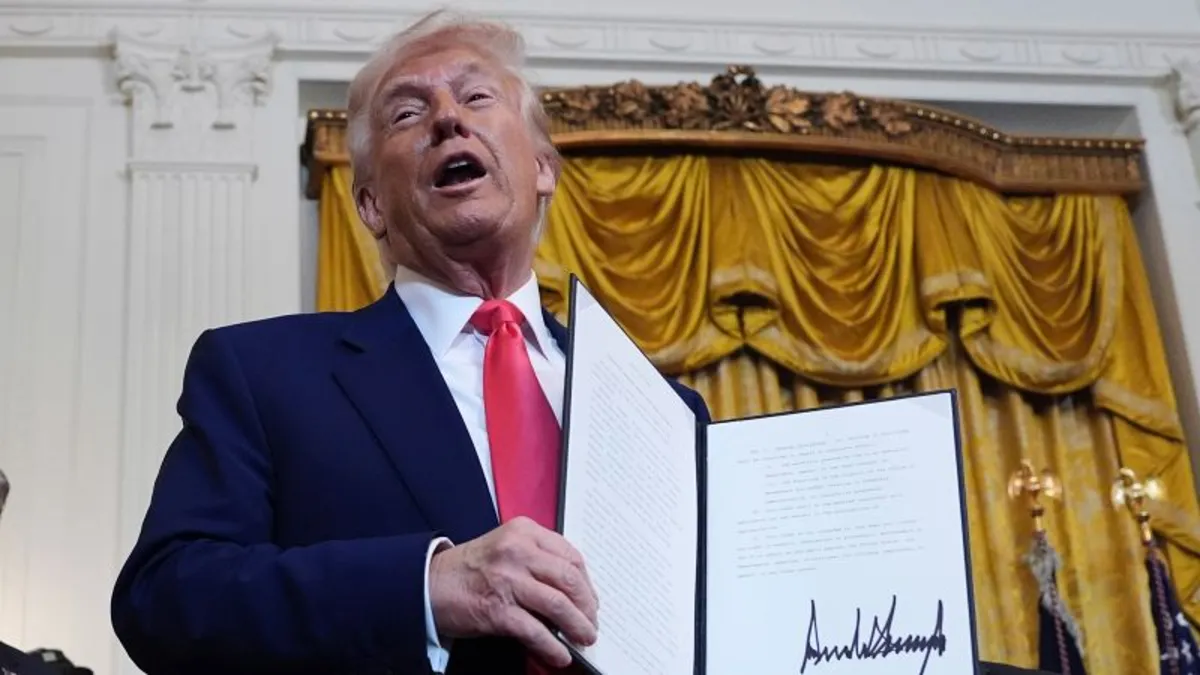
Delegations from Japan and South Korea are currently en route to the United States, while Italy’s prime minister is scheduled to arrive in Washington next week. Amidst these developments, the White House has highlighted Israel’s proactive approach to forging new trade agreements with the US as a potential model for other nations. This comes just one day before President Donald Trump’s new worldwide tariffs take effect, leading to an open invitation for new trade negotiations from the White House.
On Tuesday, Trump expressed that foreign leaders are urgently seeking to negotiate deals to avoid the impending tariffs. “These countries are calling us up. Kissing my a. They are dying to make a deal,” he stated during a gathering with Republicans. He described the attempts of foreign leaders to engage with his administration as desperate, saying, “Please, please sir, make a deal. I’ll do anything, sir.” This sentiment highlights the urgency with which countries are responding to Trump’s sweeping tariff announcements.
As global leaders scramble to react to these tariffs, many are receiving guidance from US diplomats encouraging them to think creatively beyond traditional trade negotiations. The White House has suggested that countries should leverage unique proposals, which could include securing the freedom of Americans wrongfully detained abroad, increasing purchases of US energy, or collaborating with US artificial intelligence companies as they prepare for negotiations. Five individuals familiar with these discussions have indicated that these creative ideas are being actively considered.
As the tariff deadline approached, not only foreign leaders but also CEOs from some of the largest multinational companies reached out to the White House. Many of these business leaders, who have been cautious about publicly criticizing Trump’s tariff policies, nonetheless maintained active backchannels to express their concerns about the potential negative impacts on the global economy and the credibility of American business practices. This influx of communication from corporate leaders was described by one CEO as a “tsunami” in recent days.
Trump acknowledged the shifting message towards more deal-making after expressing frustration with Commerce Secretary Howard Lutnick’s public statements, which appeared to exacerbate market instability. With increasing pressure from lawmakers facing angry constituents, it became evident that the administration needed to recalibrate its approach to tariffs and trade.
White House officials have indicated that the requirements for trade negotiations will vary by country. Trump has characterized his strategy as “one-stop shopping,” using the threat of tariffs as leverage on a range of issues, including military presence and foreign aid. This approach could allow for more comprehensive agreements beyond simple trade barriers.
In discussions with China, for example, one proposal on the table is for President Xi Jinping to publicly declare that Chinese companies should cease production of fentanyl precursor chemicals. This move would address the ongoing global drug crisis, which has been a priority for Trump.
As negotiations are set to commence, the intricacies of crafting tailored agreements with as many as 70 countries have not gone unnoticed by Trump. He suggested that the logistics of drafting these agreements could involve enlisting lawyers from large law firms, indicating the need for substantial legal talent to manage the expected influx of negotiations. “We need a lot of talent. We have a lot of countries coming that want to make deals,” he remarked.
However, the administration faces significant challenges as it attempts to negotiate these new agreements in a timely manner. Despite the eagerness of many foreign leaders to engage, the complexities of international trade negotiations and Trump's own tariffs present hurdles that may not be easily overcome.
Trump acknowledged the destabilizing effects of his tariffs on global markets, referring to them as “somewhat explosive.” Recent mixed signals from the administration have caused market fluctuations, with different officials providing conflicting statements regarding the potential for tariff adjustments. This communication gap has left many countries uncertain about how best to approach negotiations.
As former Trump administration officials have noted, the lack of a clear end goal for negotiations could lead to chaos rather than productive discussions. The president’s consistent demand for "more" in any negotiation raises questions about whether he is genuinely open to compromise or simply seeking to extract greater concessions from foreign partners.
As the new tariffs set to take effect, the international community watches closely to see how these negotiations will unfold. With countries rushing to engage in talks and business leaders voicing their concerns, the effectiveness of Trump's strategy in achieving favorable trade agreements remains to be seen. The coming weeks will likely reveal whether these diplomatic efforts can lead to a more stable global trade environment.